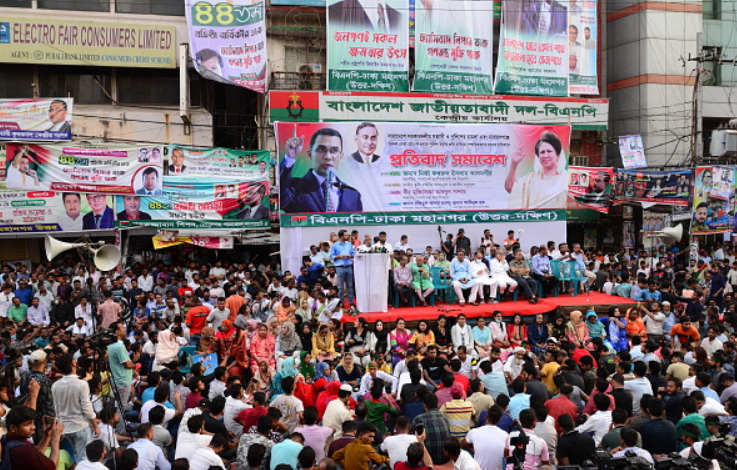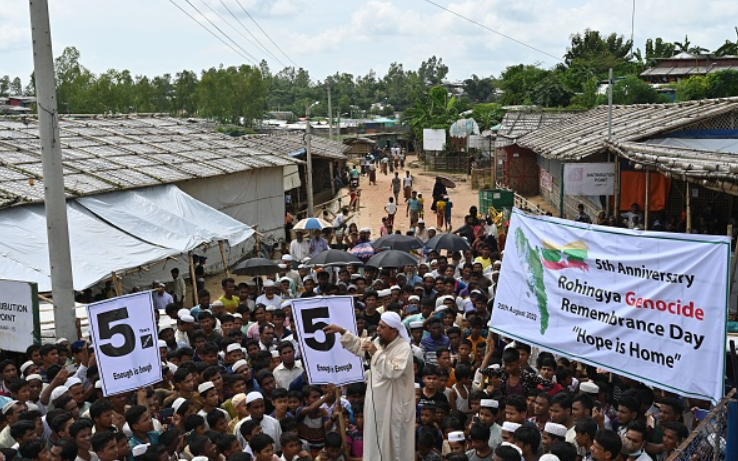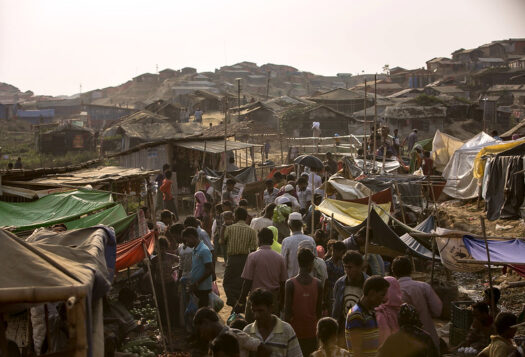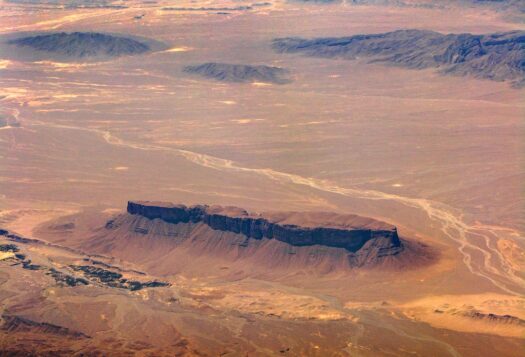
The global geopolitical emphasis on the Indian Ocean Region (IOR) and the Indo-Pacific has led to a renewed interest in regional countries. Bangladesh is no exception, particularly after the 2013 and 2014 UN verdicts granted the state unfettered access to the Bay of Bengal, a key node in the IOR. As Bangladesh celebrates its 50th year of independence, its population has reached 170 million people, the world’s 8th largest population. Meanwhile, Bangladesh has not escaped the economic and foreign policy challenges posed to many middle-income and historically non-aligned countries following Russia’s invasion of Ukraine. However, its development and foreign policy positioning has established itself as both a ‘rising middle power’ and a destination for great powers.
Economic Growth Despite Market Volatility
Bangladesh’s economy has grown rapidly in recent years. In 2020, Bangladesh recorded the highest per capita income in South Asia, growing to over $2,800 by 2022. Its foreign reserve also rose to $48 billion for the first time, thanks to the export earnings from ready-made garments (RMGs) and remittances from the Bangladeshi diaspora community. Bangladesh Bank confirmed that Foreign Direct Investment (FDI) increased by a whopping 37% in 2022 compared to 5.7% in 2021. Outward flow FDI from Bangladesh also grew to 19% last year.
Bangladesh’s development and foreign policy positioning has established itself as both a ‘rising middle power’ and a destination for great powers.
This economic growth was not achieved without challenges. In the wake of the Russia-Ukraine war, Bangladesh struggled with depleting foreign reserves, inflation, and turbulent food and energy markets. In 2022, over-invoicing of imports and under-invoicing of exports, lack of realization of export proceeds, and weak controls over money laundering and informal channels contributed to a rapidly depleting foreign reserve. For the first time since 2012, Bangladesh sought assistance from the International Monetary Fund (IMF), securing a $4.7 billion loan in early 2023. As a result of volatility in the international markets, inflation hit 9.5% in the last quarter of 2022, a ten-year high for Bangladesh. Prices for essential commodities like rice, cooking oil, wheat, and fertilizer exploded. While these prices have since decreased in the local market, inflation remains a significant challenge for ordinary Bangladeshis, impacting not only food but energy.
Despite its claim to 100% electricity coverage in May 2022, Bangladesh has joined many countries struggling with energy needs. Ongoing price hikes in international energy markets highlighted Dhaka’s shortcomings in proactively establishing access to alternative power. The 2023 inauguration of the Rooppur nuclear power plant’s second and final reactor hopefully marks a trend towards investment in non-carbon-emitting electricity generation. With the upcoming general elections in 2024, food and energy prices are likely to be front and center in appeals to voters.
Improved Infrastructure and Emphasizing Connectivity
Despite this turbulence in its economic growth, Bangladeshi investment in infrastructure paid significant dividends in 2022. As part of its “port boom,” The Container Terminal at Chittagong port began to receive larger vessels, which will help reduce commodity prices. This increased capacity will allow Bangladesh to ship directly to export destinations in Europe and from import destinations like China, increasing the tempo of trade. Both the Chittagong Bay terminal and Matarbari deep seaport are set to open fully in 2026, boosting Dhaka’s maritime capacity.
Bangladesh also made considerable progress in enhancing land connectivity. In December 2022, Dhaka inaugurated its first mass rapid transit line. Similarly, the June 2022 opening of Padma Bridge, which connects northern and southern Bangladesh, promises to enhance people-to-people ties and significantly cut transit time from Dhaka to Bangladesh’s second largest seaport, Mongla, facilitating more efficient trade. Bangladesh constructed the bridge with no external funding, a significant point of pride for a country once called a “test case of development.”
Domestic Political Landscape
Domestic politics heated up over the year ahead of general elections, which are slated to take place by the end of 2023 or early 2024. Economic volatility, energy shortages, and human rights issues galvanized the public to take the streets, organizing in protests through the end of the year led by the Bangladesh Nationalist Party (BNP). Although the BNP leveraged protests to advance political goals, widespread turnout more likely indicates escalating public frustration with the Awami League (AL) instead of shifting political alignments. The BNP remains a weak opposition party, while unrest demonstrates public concern over raising prices and issues relating to daily livelihoods.
Protests received considerable attention from the diplomatic community. While the AL jailed protesters, international parties called on leaders to ensure a level playing field for all political parties. The AL gradually loosened control, ceding greater space to the BNP for rallies to take place in ten major cities of the country. At the largest political rally on December 10, BNP leaders called for a neutral caretaker government to be reinstated ahead of the next election cycle. Least to say, Bangladesh’s domestic political scene will remain heated throughout 2023.
Resolving the Rohingya Crisis
In a tense political environment, all parties aim to see a resolution to the Rohingya crisis and a safe and sustainable repatriation of Rohingya refugees to Myanmar. The Rohingya crisis remains one of the world’s largest refugee crises. Sorely in need of assistance from the international community humanitarian aid declined drastically in 2022 as worldwide demand reached unprecedented levels and donors struggled to triage crises in Ukraine, Afghanistan, Pakistan, the Horn of Africa, and the Sahel.

The Rohingya crisis cannot be managed by Bangladesh alone. Given that the Rohingya are denied citizenship in the country they have resided in for decades, these refugees overwhelmingly lack political rights and remain vulnerable to vagrant human rights abuses. Greater internationalization of the Rohingya issue is required. However, despite sanctions imposed on the military junta in Myanmar, major powers continued brisk business with the regime, particularly in the areas of arms production, it remains to be seen if and how a fresh wave of sanctions on the Myanmar military junta will change the situation. Meanwhile, as Bangladesh is dealing with the burden of sheltering about 1.2 million Rohingyas, the United States has agreed to relocate a meager 300-800 Rohingya refugees from Bangladesh per year in the country, which is still a meager number. For Bangladesh to achieve its economic and geopolitical potential, greater support is needed from high-income states to alleviate this great human suffering.
Courting Investment and Bilateral Ties
In foreign policy, the world witnessed a different Bangladesh last year. Bangladesh’s growing economic strength as well as its positional reality at the Bay of Bengal have provided its long-aspired agenda-setting capacity in its own affairs. Meanwhile, increased emphasis on the IOR and socio-economic shifts have made great powers eager to court Bangladesh. Existing strategic ties with the United States and the United Kingdom were revitalized and the European Union also initiated its first-ever Bangladesh-EU Political Dialogue in November.
Bangladesh looks forward to an interesting 2023, where it will have to deal with strategic challenges externally as well as internal challenges relating to the general election and rising prices of the commodities.
Closer to home, India, China, and Japan also courted Dhaka. India and Bangladesh are currently discussing a Comprehensive Economic Partnership Agreement (CEPA). China appears keen to demonstrate its commitments in Bangladesh, with China’s newly appointed Foreign Minister Qin Gang choosing to make a stopover in Bangladesh to hold talks just as his predecessor Wang Yi did in August of 2022. Japan has also pursued strong ties with Bangladesh, with the two states considering launching a Japan-Bangladesh Economic Partnership Agreement (EPA). Bangladesh is expected to become a lower middle-Income country in 2026 and has made bilateral economic agreements with major trading partners facets of its both economic and development diplomacy. While firmly ground in historical trends, Dhaka will continue to navigate a difficult foreign policy environment amid economic growth and strategic competition.
“Friendship to All, Malice towards None”
In 2022, the Russia-Ukraine conflict emphasized Bangladesh’s role as a middle power. Bangladesh was one of the 38 countries to abstain in the United Nations General Assembly (UNGA) resolution undertaken in March 2022 condemning Russia’s aggression in Ukraine, as it did in a similar vote on Crimea in 2014. Although Bangladesh voted against Russia in a UNGA resolution in October 2022 that condemned Russia in its attempt to annex four provinces of Ukraine, the country once again abstained from voting against Russia in a crucial resolution that condemned it for violating international law. Western states like the United Kingdom have repeatedly sought Bangladesh’s support on the Russia issue with little success.
While Western countries may be frustrated by Bangladesh’s refusal to cleave neatly to bloc politics, the country has always followed a policy of ‘friendship to all, malice towards none.’ Bangladesh believes in an international order determined by independent relations, where countries are not forced to choose sides between great powers. True to its history of nonalignment, Bangladesh appears unlikely to strongly favor any side for the foreseeable future. However, instead of following the principles of equidistance during the Non-Aligned Movement (NAM) of the 20th century, the contemporary approach stands as rather similar to the great powers, which aptly describes its foreign policy practices of engagement. Needless to say, Bangladesh looks forward to an interesting 2023, where it will have to deal with strategic challenges externally as well as internal challenges relating to the general election and rising prices of the commodities.
***
Image 1: Mamunur Rashid/NurPhoto via Getty Images
Image 2: Munir Uz Zaman/AFP via Getty Images


